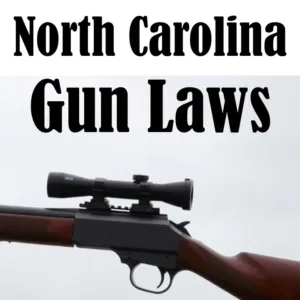North Carolina has a mix of permissive and restrictive firearm laws. This guide explains the state’s requirements for purchasing firearms, open and concealed carry regulations, restricted locations, and self-defense laws. Understanding North Carolina’s gun laws helps residents and visitors make informed, lawful choices.
North Carolina Gun Laws Overview

Purchasing Firearms in North Carolina
North Carolina requires permits to purchase handguns but not long guns, and all licensed dealer sales are subject to background checks.
Key Requirements:
- Permit to Purchase: Required only for handguns. A pistol purchase permit or a concealed handgun permit is needed to buy a handgun.
- Background Check: Required for all firearm purchases from licensed dealers.
- Waiting Period: There is no mandated waiting period, though the permit process can take some time.
- Minimum Age: Federal law sets the minimum age at 18 for long guns and 21 for handguns.
Pistol Purchase Permit and Concealed Handgun Permit
To buy a handgun in North Carolina, residents must obtain either a pistol purchase permit or a concealed handgun permit.
Steps to Obtain a Pistol Purchase Permit:
- Eligibility Requirements: Applicants must be at least 21 for handguns and pass a background check. County sheriffs may consider additional factors like mental health and criminal history.
- Application: Apply at the county sheriff’s office, including fingerprinting and fees.
- Approval Time: Permit issuance can take several days to weeks.
- Permit Validity: Pistol purchase permits are valid for up to five years.
Private Sales and Background Checks
Private sales of handguns in North Carolina require a pistol purchase permit or concealed carry permit, but private sales of long guns do not require permits or background checks.
Open Carry in North Carolina
North Carolina permits open carry for individuals who legally possess firearms, with certain location-based restrictions.
Key Points on Open Carry:
- Permitless Open Carry: Open carry is legal without a permit for individuals 18 and older.
- Location Restrictions: Local governments may impose restrictions in specific locations, such as government buildings.
- Vehicle Carry: Firearms may be carried openly in vehicles, but they must be visible or securely stored to comply with North Carolina law.
Concealed Carry in North Carolina
North Carolina is a “shall-issue” state, meaning a concealed handgun permit (CHP) must be issued to qualifying applicants.
How to Obtain a Concealed Handgun Permit (CHP):
- Eligibility Requirements: Applicants must be at least 21, pass a background check, and meet additional state requirements.
- Training Requirement: North Carolina requires concealed carry applicants to complete a firearms safety and training course.
- Application Process: Submit the application to the county sheriff, including fees, fingerprints, and proof of training.
- Permit Validity: Permits are valid for five years and must be renewed to maintain concealed carry rights.
Reciprocity with Other States
North Carolina recognizes concealed carry permits from many other states, allowing those with valid permits to carry concealed firearms within the state. Checking current reciprocity agreements is recommended before traveling.
Restricted Locations for Carrying Firearms in North Carolina
There are several restricted areas for firearms in North Carolina, and permit holders must follow these rules to avoid penalties.
- Schools and University Campuses: Firearms are prohibited on all K-12 school grounds and educational property.
- Government Buildings: Courthouses, police stations, and certain other government buildings prohibit firearms.
- Private Property: Property owners may restrict firearms on their premises; individuals must comply with posted signs.
- Places of Worship and Events: Carrying firearms at public events and in religious institutions is restricted, though some places of worship allow licensed carry with permission.
Assault Weapons and Magazine Capacity in North Carolina
North Carolina does not impose state-level restrictions on assault weapons or magazine capacity, permitting residents to own and use a range of firearms without limitations.
Self-Defense Laws in North Carolina: Stand Your Ground and Castle Doctrine
North Carolina recognizes both Stand Your Ground and Castle Doctrine laws, allowing individuals to defend themselves without a duty to retreat in specific situations.
Stand Your Ground
Under North Carolina’s Stand Your Ground law, individuals may use force, including deadly force, to defend themselves without a duty to retreat if they are lawfully present and face an immediate threat.
Castle Doctrine
North Carolina’s Castle Doctrine permits individuals to defend themselves within their home, vehicle, or workplace without a duty to retreat if they reasonably believe they face an imminent threat.
Firearms Prohibited Persons in North Carolina
North Carolina has restrictions on firearm possession for individuals based on criminal history, mental health, and other legal considerations.
- Felony Convictions: Those convicted of felonies are prohibited from firearm ownership unless rights are restored.
- Domestic Violence Convictions: Individuals with certain domestic violence convictions or restraining orders may not possess firearms.
- Mental Health Restrictions: Individuals deemed mentally unfit by a court may be restricted from firearm possession.
- Substance Abuse: Certain drug-related offenses can result in restrictions on firearm rights.
Penalties for Violating Gun Laws in North Carolina
Violations of North Carolina’s firearm laws can result in severe penalties, including fines, imprisonment, and potential loss of firearm rights.
- Unlawful Possession: Possessing a firearm as a prohibited person or in a restricted area may lead to criminal charges.
- Carrying in Restricted Areas: Bringing firearms into prohibited locations such as schools or government buildings can result in legal consequences.
- Failure to Comply with Local Ordinances: North Carolina’s preemption law generally prohibits local gun regulations, but following state laws is essential.
Conclusion: Understanding North Carolina’s Gun Laws
North Carolina offers flexibility for open and concealed carry while maintaining specific restrictions on purchasing, carrying in restricted areas, and self-defense. Staying informed on these rules is essential for residents and visitors to avoid penalties and maintain lawful firearm use.
FAQs About Gun Laws in North Carolina
1. Do I need a permit to buy a gun in North Carolina?
Yes, North Carolina requires a permit to purchase handguns but not long guns.
2. Is open carry allowed in North Carolina?
Yes, open carry is legal for individuals 18 and older without a permit.
3. Does North Carolina restrict magazine capacity?
No, North Carolina does not impose magazine capacity limits.
4. Does North Carolina recognize out-of-state concealed carry permits?
Yes, North Carolina honors permits from many states with reciprocity agreements.
5. What self-defense laws apply in North Carolina?
North Carolina enforces Stand Your Ground and Castle Doctrine laws, allowing self-defense without a duty to retreat in specific situations.
